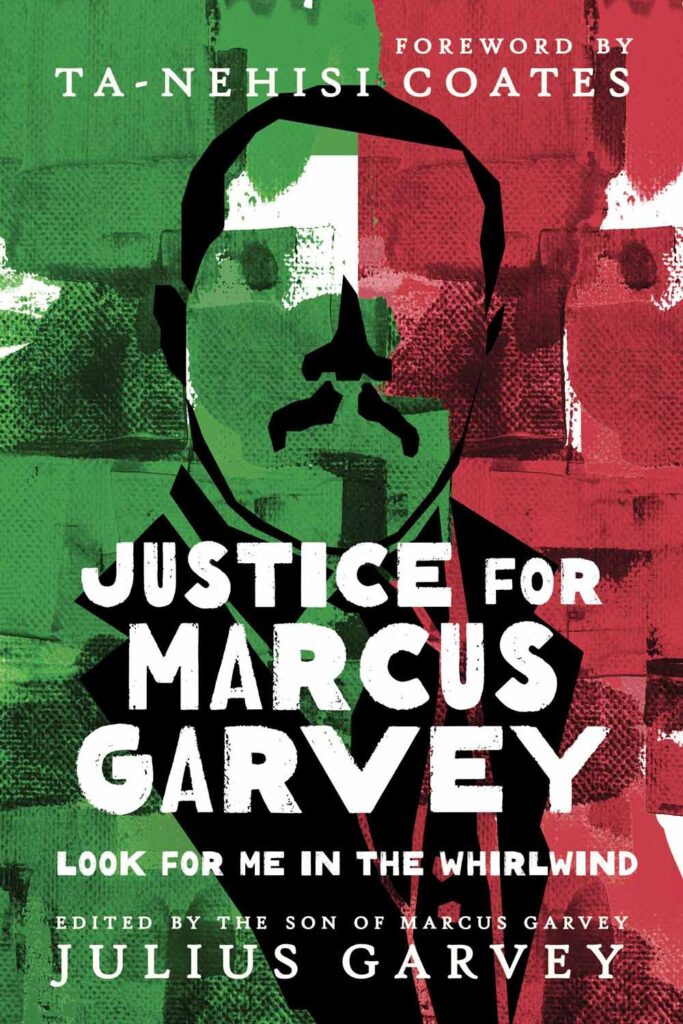Not only did I greatly admire Garvey, but his conviction also represented one of the most poignant examples of the injustice that the law can exert on an individual’s life trajectory and indeed the trajectory of thousands of people who follow that person if the individual is a political leader.
Justin Hansford, Professor of Law, Howard University School of Law
Executive Director, Thurgood Marshall Civil Rights Center
There have been many books written about Marcus Mosiah Garvey; Justice for Marcus Garvey, Look For Me In The Whirlwind (Broadleaf, 2024), a book of essays with a foreword by TaNehisi Coates and edited by Julius Garvey the son of Marcus Garvey, presents readers with an update on the rationale for pardoning Garvey and on the history, analysis, and impact of Marcus Garvey, an international social justice leader committed to a Pan Africanist philosophy embedded in the principles of the Universal Negro Improvement Association (UNIA). Justice for Marcus Garvey is a “Call of Action” from Black journalists, publishers, booksellers, activists, lawyers, and scholars who have advocated and signed petitions for Garvey’s full exoneration.
Efforts to exonerate Garvey began 100 years ago on June 21, 1923 when he was found guilty of mail fraud. He was 36 years when he was indicted and the call to exonerate him took many forms over the years. Howard University Law Professor Hansford’s statement describing his indictment as a travesty of injustice speaks to the core principles underlying the “Call to Action for Marcus Garvey.”
In the foreword, TaNehisi Coates argues that we need a counternarrative that represents Garvey’s wrongful indictment and that Garvey’s philosophy has become a part of hip hop culture. He asks readers to analyze “Halftime” by Nas, “Malcolm, Garvey, and Huey” by Dead Pretz, and “The Blacker the Berry” by Kendrick Lamar. What also comes to mind for me is the signature album “Mos Def and Talib Kweli are Black Star.” Coates notes that “Garvey is in reggae, our jazz, our art, our writing, our politics, and our way of seeing the world.”
A uniqueness of Julius Garvey’s book is the cross-range of oral history essays from a core of publishers, booksellers, journalists, and activists who give personal testimonies on how Garvey’s philosophy and world view influenced their publishing, bookselling, writing, and personal lives.
The book begins with essays in a section titled, “The Exoneration Effort and Why.” It continues with the sections “Understanding the Legal Wrong and the Effort to Right It”, “Garvey’s Activism in Jamaica,” and “Garvey Lives.” Julius Garvey also provides readers with an extensive bibliography of additional readings about Garvey and the legal issues surrounding his attempts to fight the indictment.
In the section “The Exoneration Effort and Why,” Paul Coates, the founder and publisher of Black Classic Press, reminds readers that “Garvey’s enthusiastic and unapologetic promotion of positive Black images and literature is the model adhered to by the most enduring Black book publishers in the US. Haki Madhubuti, the founder and publisher of Third World Press states “ It is difficult to be psychologically and culturally Black and politically and economically serious in America and not have been influenced by Garvey’s philosophy and actions.”
Karl B. Rodney, the co-founder of Carib News, describes the Garvey philosophy as a great river. In his words, The Garvey Philosophy, the Garvey Drive, and the Garvey Prophecy” are like a great river that flows through the continents of the world, flooding us with a philosophy, a set of values, and a way of thinking and living that changes the lives of Black people wherever we are.
In Section 2, those who seek a deeper understanding of Garvey’s court case will find supporting evidence contradicting the charges levied against Garvey and documents of the wide-range national and international support to exonerate him. They may be surprised by the evidence of attacks by White Supremacist groups, integrationists, socialists, and communists. Garvey was portrayed in the media and political environment as a man who disturbed race relations.
On his last day in office, on January 21, 2024, President Joe Biden pardoned Garvey in response to the advocacy of elected officials and leaders, as well as millions of petitions arguing for the pardon. However, this pardon represents only one critical segment in the 100 year struggle to posthumously and fully exonerate Garvey. Congresswoman Yvette Clarke is continuing this struggle with a legislative Marcus Garvey Legacy Package that she initiated on August 20, 2025.
The Congressmember states that while President Biden’s pardon represents tremendous progress towards righting a great wrong, “We cannot rest until a great injustice is expunged in its entirety.” The legislation calls for a “full and unambiguous exoneration that finds Garvey innocent of the politically motivated charges against him.”
Justice for Garvey is a reminder that the struggle for justice is intergenerational and is ever present. Julius Garvey, MD, FACS, FRCS, the Editor is a retired physician who lectures on the life and legacy of his father, the Honorable Marcus Mosiah Garvey.
Dr. Brenda M. Greene is Professor Emeritus and Founder and Executive Director Emeritus of the Center for Black Literature at Medgar Evers College, CUNY. For more information, visit https://www.drbrendamgreene.com
